逃がした魚は大きいとは?
「逃がした魚は大きい」とは、一度手にしかけたものや失ったものが、後になってから実際以上に大きく、価値があるように思えてしまう心理を表すことわざです。
人は過去の失敗や失ったチャンスについて考えると、それを過大評価する傾向があります。逃がした魚が実際に大きかったかどうかに関わらず、「もし手にしていたら…」という後悔や空想が膨らむためです。
由来
ことわざの由来は、釣りの体験に基づくと考えられます。釣りをしていて逃げられた魚を、釣り人は「あの魚は大物だったに違いない」と思い込むことがあります。実際には魚のサイズが分からなくても、「逃した」という事実が強調されて記憶に残り、価値が増大して感じられるのです。
使用例
日常生活の例
「転職しようと考えていた会社の選考を辞退したけど、今さら後悔している。逃がした魚は大きいなぁ。」
恋愛の例
「昔の恋人がすごくいい人だったのに別れてしまった。今になって逃がした魚は大きかったと実感してるよ。」
ビジネスの例
「あの取引をしなかったけど、今の市場価値を考えると大損だったかも。逃がした魚は大きいね。」
心理的背景
このことわざは、人間の「後悔」や「未練」に基づく心理現象を指摘しています。
選択の後悔
過去に選ばなかった選択肢に価値を見出してしまう「選択後悔の心理」が働きます。特に、明確に手に入れられそうだったものを逃すと、その価値が心の中で増幅されます。
手に入らないものへの憧れ
人間は手に入らないものを理想化する傾向があります。逃がした魚が「大きかった」と思い込むのは、失ったものを実際よりも魅力的に感じてしまう心理の表れです。
教訓と適用
このことわざは、過去に囚われすぎず、前向きな姿勢を持つことの大切さを教えています。
過去に囚われない
逃したチャンスや失ったものをいつまでも悔やむのではなく、現在の状況や未来に目を向けることが重要です。
現実を受け入れる
実際に「逃がした魚」が本当に価値があったのかを冷静に分析することが必要です。思い込みで価値を大きくしていないかを考えましょう。
後悔を学びに変える
逃した経験から学び、次に同じような状況に直面したときにどうすべきかを考えることで、成長につながります。
類似のことわざや表現
英語の表現
「The one that got away.(逃げたものが最良だと思う)」
釣りを題材にした同様の表現が英語にもあります。
類似のことわざ
「覆水盆に返らず」
一度失ったものは取り戻せないという意味。
「隣の芝生は青い」
他人のものが実際以上に良く見える心理を指します。
現代社会での解釈
現代では、過去の選択やチャンスを後悔するケースが多く見られます。特に以下のような場面でこのことわざの教訓が適用されます:
投資やビジネス
機会損失の悔しさにとらわれず、次の投資や行動に集中する。
人間関係
過去の恋愛や人間関係を引きずるのではなく、新たな人間関係を築く努力をする。
キャリア
転職や進学の選択を振り返りすぎず、現状を改善する方法を探る。
注意点
「逃がした魚は大きい」という思考にとらわれすぎると、現在の状況や新しいチャンスに目を向けられなくなる可能性があります。過去に囚われることなく、冷静に状況を見直す視点が必要です。
「逃がした魚は大きい」は、失ったものや逃したチャンスを実際以上に価値あるものと思い込んでしまう人間の心理を表したことわざです。過去を振り返るだけではなく、それを教訓にし、前向きに行動することが、この言葉の本当の意味を活かす方法といえます。
The saying “the fish that got away is bigger than the fish that got away” describes the mentality that once something is nearly taken or lost, it later seems bigger and more valuable than it actually is.
When people think about past mistakes or lost opportunities, they tend to overestimate them. Regardless of whether the missed fish was actually big or not, the regret and fantasy of “what if I had gotten it…” grows.
Origin
The origin of the proverb is thought to be based on a fishing experience. When a fish escapes while fishing, an angler may assume that the fish must have been a big one. Even if the actual size of the fish is not known, the fact that it was missed is emphasized and remembered, and its value is perceived as increased.Examples of Use
Examples from daily life
I turned down a job offer at a company I was thinking of changing jobs, but now I regret it. The fish that got away is big.Example in love
My old boyfriend was a very nice person, but we broke up. Now I realize that the fish that got away was too big.Business example
I didn’t make that deal, but considering the current market value, it was a huge loss. The fish I missed out on was a big one.Psychological Background
This proverb points to a psychological phenomenon based on human “regret” or “regretfulness.Choice regret
The “psychology of choice regret” works by finding value in choices that were not made in the past. In particular, when we miss out on something that was clearly obtainable, its value is amplified in our minds.Longing for the unobtainable
Humans tend to idealize the unobtainable. The belief that the fish you missed was “too big” is a psychological manifestation of feeling that what you lost is more attractive than it actually is.Lessons Learned and Applied
This proverb teaches the importance of having a positive attitude and not getting too caught up in the past.Don’t get stuck in the past.
Instead of forever regretting missed opportunities or lost ones, it is important to focus on the present situation and the future.Accept reality
It is necessary to calmly analyze whether the actual “fish you missed” was really worth it. Consider whether you are making assumptions that make the value too great.Turn regrets into learning
Learning from missed experiences and thinking about what to do the next time you face a similar situation will help you grow.Similar proverbs and expressions
Expressions in English
The one that got away.(I think the one that got away is the best)
Similar expressions on the subject of fishing are also found in English.Similar proverbs
“What is lost is never recovered.”
It means that once you lose something, you can never get it back.The grass is greener on the other side
Refers to the mentality that other people’s things look better than they really are.Interpretation in modern society
In today’s world, we often find ourselves regretting past choices and opportunities. The lessons of this proverb are especially applicable in the following situationsInvestment and business
Do not dwell on the regret of lost opportunities, but focus on the next investment or action.Relationships
Instead of dwelling on past romances and relationships, make an effort to build new ones.Career
Explore ways to improve the current situation instead of looking back too much on career change or higher education choices.Cautions
Getting too caught up in the “big fish that got away” mentality can make it difficult to focus on the current situation and new opportunities. It is necessary to have the perspective to calmly review the situation without getting stuck in the past.The saying “the fish that got away is bigger than the fish that got away” describes the human psychology of believing that lost or missed opportunities are more valuable than they actually are. The way to make the most of the true meaning of this saying is not only to look back at the past, but also to learn from it and take positive action.
AIが描いた「逃がした魚は大きい」
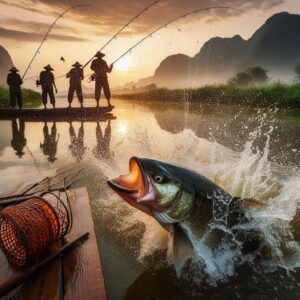

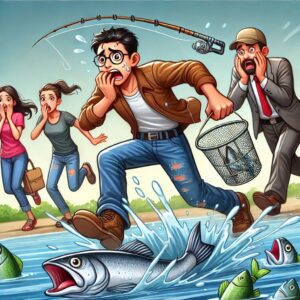
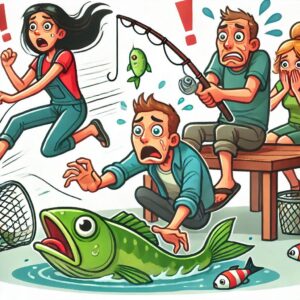
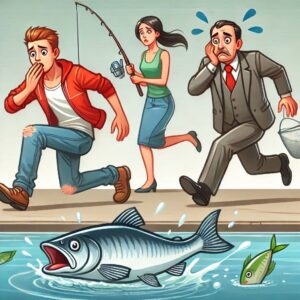
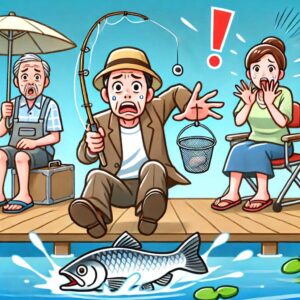
















コメント